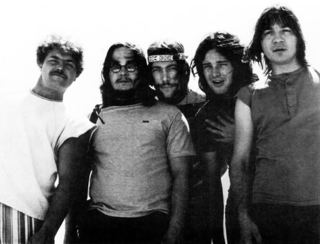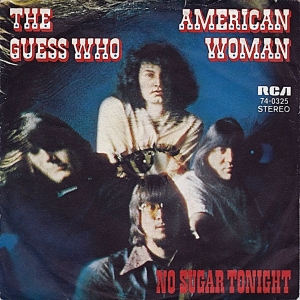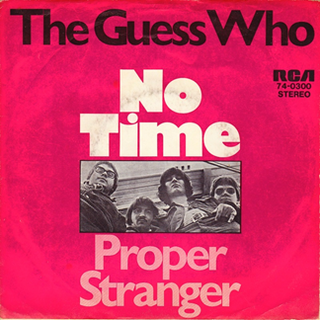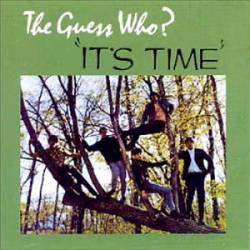
The Guess Who was a Canadian rock band formed in Winnipeg, Manitoba in 1965. The band found their greatest success in the late 1960s and early 1970s, under the leadership of singer/keyboardist Burton Cummings and guitarist Randy Bachman, with hit songs including "American Woman", "These Eyes", and "No Time".

Moose Jaw is the fourth largest city in Saskatchewan, Canada. Lying on the Moose Jaw River in the south-central part of the province, it is situated on the Trans-Canada Highway, 77 km (48 mi) west of Regina. Residents of Moose Jaw are known as Moose Javians. The city is surrounded by the Rural Municipality of Moose Jaw No. 161.

Burton Lorne Cummings is a Canadian musician and songwriter. He is best known for leading The Guess Who during that band's most successful period from 1965 to 1975, and for a lengthy solo career.

American Woman is the sixth studio album by Canadian rock band the Guess Who, released in January 1970. It was the last to feature lead guitarist Randy Bachman until a reformation effort in 1983. The album was one of their most successful releases, receiving Gold certification in the United States.

The Western Canadian Baseball League (WCBL) is a collegiate summer baseball league. The league is home to teams based in the Canadian Prairie provinces of Saskatchewan and Alberta, and has roots dating back to 1931 in Saskatchewan's Southern Baseball League. In 1975, the province's southern and northern leagues merged, creating the foundation for the WCBL. Today, the league boasts seven teams in Alberta and five in Saskatchewan.
Music in the Canadian province Saskatchewan, one of the Prairie Provinces, includes a variety of genres including Indigenous music, folk, country, jazz, and classical traditions.

"American Woman" is a song by Canadian rock band the Guess Who, released January 1970, from the album of the same name. It was later released in March 1970 as a single backed with "No Sugar Tonight", and it reached number one for three weeks commencing May 9 on both the United States' Billboard Hot 100 and the Canadian RPM magazine singles chart. Billboard magazine placed the single at number three on the Year-End Hot 100 singles of 1970 list, and it was listed as number five for 1970 on the RPM Year-End Chart. On May 22, 1970, the single was certified as gold by the Recording Industry Association of America (RIAA). It also reached the top ten in the Netherlands, Switzerland and Austria, and the top twenty in the United Kingdom and New Zealand.

Kurt Frank Winter was a Canadian guitarist and songwriter, best known as the lead guitarist for The Guess Who from 1970 to 1974.
MacLean & MacLean were a Canadian musical comedy duo. They performed regularly in Canada between 1972 and 1998 and recorded seven albums. The duo consisted of brothers Gary MacLean (1944–2001) and Blair MacLean (1942–2008). The MacLeans were originally from Glace Bay, Nova Scotia, but were later based in Winnipeg, Manitoba.

"No Time" is a song by Canadian rock band The Guess Who, composed by guitarist Randy Bachman and lead singer Burton Cummings.

Michael James Kale is a Canadian rock musician, best known as the original bassist for the rock band The Guess Who. He was also a member of the band Scrubbaloe Caine. In 1987, he was inducted into the Canadian Music Hall of Fame as a member of The Guess Who.

Culture of Saskatchewan views the patterns of human activity in the central prairie province of Canada examining the way people live in the geography, climate, and social context of Saskatchewan.

"These Eyes" is a song by the Canadian rock band The Guess Who. The song was co-written by the group's lead guitarist Randy Bachman and lead singer Burton Cummings and originally included on the band's 1969 album Wheatfield Soul. It was first released as a single, in their native Canada, where its chart success (#7), along with the influence of CKLW-AM Windsor's radio station music director Rosalie Trombley, helped land them a U.S. distribution deal with RCA Records. It was subsequently released in the U.S. in March 1969, and became a breakthrough success for the group, as it would be their first single to reach the top ten on the Billboard Pop Singles chart, peaking at number six, and would eventually be certified gold by the RIAA for sales of over one million copies. It was also a top ten hit in South Africa. While it was actually the 18th single released by the band overall, it was the first from the line-up of Cummings, Bachman, Jim Kale, and Garry Peterson as produced by Jack Richardson.

Share the Land is the seventh studio album by Canadian rock band The Guess Who, released in October 1970. It was their first album following the departure of Randy Bachman, and the band brought in two new guitarists, Kurt Winter and Greg Leskiw. The album was another international success for the band, reaching number seven in Canada and number fourteen in the US, and spawned three hit singles in the title track, "Hand Me Down World" and "Hang On to Your Life".

It's Time is the third studio album by the Canadian rock band The Guess Who. It's also the last to feature original lead singer Chad Allan who left before the release of the album. This album introduces Burton Cummings and Bruce Decker of The Deverons. Bruce Decker is shown on the album cover, but did not perform on the album. This album was a big turning point for the group. The album draws towards their garage rock style.

Live at the Paramount is a live album released by Canadian rock group The Guess Who in 1972. It was recorded on May 22, 1972 at the Paramount Theatre in Seattle, Washington. Live at the Paramount was the first Guess Who album to feature Donnie McDougall on rhythm guitar and the last to feature original bassist Jim Kale. It also includes performances of three exclusive songs not included on any of their studio albums: "Glace Bay Blues," "Runnin' Back to Saskatoon," and "Truckin' Off Across the Sky."

"Hand Me Down World" is song written by Kurt Winter, performed and released in 1970 by The Guess Who, for whom Winter served as lead guitarist from 1970 to 1974 and 1977 to 1978. It reached #10 in Canada, #17 on the Billboard Hot 100, and #65 in Australia. The song was also released in the United Kingdom as a single, but did not chart. It is featured on their 1970 album, Share the Land.
Brother was a short-lived rock trio from Winnipeg, Manitoba, best known for the fact that all three members later joined The Guess Who. They are only known to have recorded three songs.

"Albert Flasher" is a song written by Burton Cummings and performed by Canadian rock band The Guess Who. Initially released as the B-side of their "Broken" single in 1971, it was promoted to A-side status in mid-May of that year, according to the Billboard Hot 100 chart. It did not appear on any of their studio albums at that time, although it would much later be included on reissues of the band's 1971 album So Long, Bannatyne. It would also appear on many of their later compilation albums, including the 1973 release The Best of The Guess Who Volume II and the 1973 compilation EP titled The Guess Who. It was also performed many times in concert, including the performance captured on Live at the Paramount (1972).

The Best of The Guess Who Volume II is the fifth compilation album by the Canadian group The Guess Who. It was originally released by RCA Records in 1973, and contains recordings made between 1970 and 1973.

















